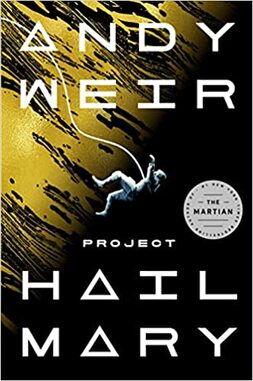|
By the time I made my decision to quit my career in clinical medicine, I had convinced myself that I wasn’t enough of a science person to remain engaged. Most clinicians around me seemed fascinated by the disease processes we monitored, whereas I only saw horror and despair as my patients’ lives were taken from them, severely altered or, at best, inconvenienced. This month, however, when my daughter needed extra sources in order to study cell biology, I had the tools to help – two old textbooks that would explain everything there was to know about organelles. And as I flipped through to mark the pages, I skimmed several lines. Surprisingly, this was enough to spark my interest. Perhaps writing English papers had been more interesting, but there was a time when science made sense as a choice.
Project Hail Mary was Mr. Weir’s chance to totally geek out on the page, so if you’re someone who likes conducting physics, chemistry or microbiology experiments in your garage lab on the weekends, you’re going to love this book. You’re also going to love the offhand comments about the state of the world we live in – like how we might be need be concerned about what pronouns to use should we need to refer to any aliens we meet on our space ventures, or whether sexual orientation should be a consideration when choosing astronauts for a save-the-world type of mission.
Still, I was left with many questions, mainly about the humans left on earth during this space mission. Certain key characters remain oblique (Ms. Stratt!), and while Weir touches on climate change, he conveniently avoids any discussion of conspiracy theory or other barriers to achieving large coordinated efforts to save a suddenly dying Earth. I will give Mr. Weir this, however: his main character grows and changes over the course of the book, and the ending (while fantastical) is both unexpected and satisfying. (Going back to the English geek in me, the choice of ending reminded me of a short essay on endings that I read for my writing course last summer. Writer Jennifer De Leon points out that frequently there are two obvious choices for endings, but that writers have an option to imagine a third, divergent way to resolve their stories.) For these two reasons, I’m glad I stuck it out. Also, if the book offers any moral, the ability to hold Earth loosely and continually seek other possibilities in the universe, is an optimistic message, one that you could argue holds even spiritual significance. There is only one mention of God in this entire 476 page book. It’s a bit buried, and in the words of a minor character, but actually, ends up holding weight: “Do you believe in God? I know it’s a personal question. I do. And I think He was pretty awesome to make relativity a thing, don’t you? The fast you go, the less time you experience. It's like He’s inviting us to explore the universe, you know?” (305-6) The protagonist makes no mention of his own beliefs, but he somehow – through the spontaneous creation of friendship and love – attains the faith he needs to remain forward-facing, attacking the next problem at hand, and always looking towards future possibilities, never ruling anything – or any other life – out. For all of you science geeks out there, you might want to take a chance on this one. It’ll give you something to think on, and make you consider who all your science work that you love so much is actually for.
0 Comments
Leave a Reply. |
Authors
The Tipsy Mamas' Book Club is co-hosted by Corinne Foster and myself, though the spirit of our discussions is flavored by many readers. Archives
November 2022
|
